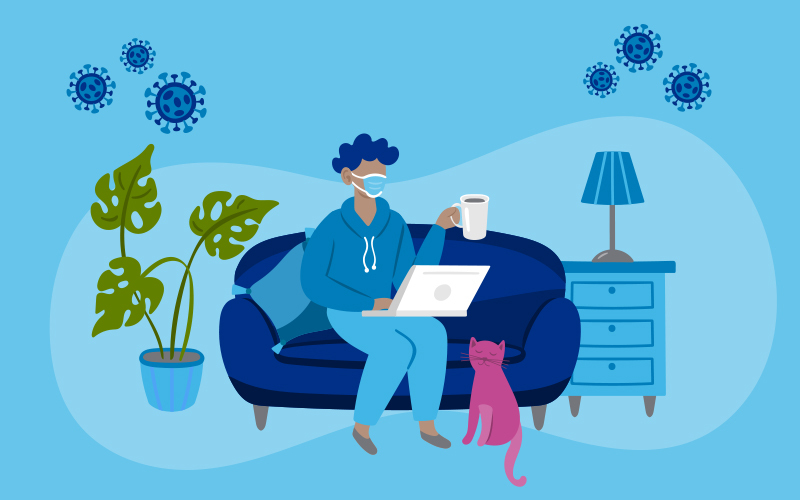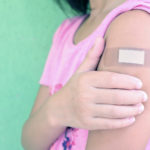Quarantining and isolating for COVID-19: Answers for families

Someone in your family has tested positive for COVID-19. You know you need to take steps to keep it from spreading — but just what does that involve? Here, we answer common questions about quarantine and isolation, based on guidance from the U.S. Centers for Disease Control and Prevention (CDC).
What is “close contact”?
Being in close contact means being within six feet of someone with a confirmed case of COVID-19 for a total of 15 minutes or more over the course of 24 hours.
I keep hearing about “quarantine” and “isolation.” What’s the difference?
Both of these strategies involve separating yourself from others to stop the spread of the coronavirus. You should quarantine when you think you’ve been exposed to the virus, even if you’re not sure whether you’ve been infected. You should isolate when you have been infected with the virus, even if you don’t have symptoms.
Takeaway: Isolate if you know you have COVID-19. Quarantine if you’re not sure.
So what do quarantine and isolation involve?
To quarantine, you should stay home and wear a face mask around others in your household if possible for five days. Watch for symptoms and get tested after five days to ensure that you’re not infected.
To isolate, you should stay home and separate yourself from others in your household for at least five days until your symptoms improve, if possible. This means staying in a separate room, using a separate bathroom, not sharing items such as towels, cups, and utensils, and avoiding contact other family members and pets. If you must be around others, wear a mask.
Takeaway: The specifics of quarantining and isolating can vary. Check out the CDC’s website for the most up-to-date recommendations.
My family attended a gathering at a friend’s home two days ago and now that friend has COVID-19. Do we need to quarantine?
It depends on your vaccination status. Kids ages 5 and up who have gotten both their first and second vaccines, as well as adults ages 18 and older who have gotten their first, second, and booster doses, do not need to quarantine. Neither do people who have had a confirmed case of COVID-19 within the last 90 days. Everyone should wear a well-fitting mask indoors around others for 10 days after close contact.
Takeaway: Fully vaccinated people ages 5 and older don’t need to quarantine after close contact with someone who has COVID-19, but should wear a mask when in public indoor spaces for 10 days after close contact.
My 18-year-old son has been vaccinated but not yet boosted. His basketball teammate was just diagnosed with COVID-19. Should my son quarantine?
Yes. Any adult who has been in close contact with someone who has COVID-19 should quarantine if they have not received their booster dose. They should also quarantine if they haven’t been vaccinated.
Takeaway: People who aren’t fully vaccinated or vaccinated at all should quarantine after close contact with someone who has COVID-19.
I tested positive for COVID-19 but don’t have any symptoms. Do I still need to isolate?
Yes. Even if you never develop symptoms, you should still isolate for at least five days. If you still test positive after those five days, you should continue to isolate for another five days.
Takeaway: You should isolate if you test positive for COVID-19, regardless of whether you have symptoms or have been vaccinated.
Full vaccination by age
Someone is considered fully vaccinated if:
– Ages 5 to 11: They have received both primary doses of the Pfizer vaccine.
– Ages 12 and up: They have received both primary doses of the Pfizer vaccine, as well as a third “booster” dose.
Get more answers about COVID-19.
Related Posts :
-

‘Feeling empowered’: How vaccination helped me care for my family when one son got COVID-19
In mid-November, I awoke to an email from my children’s school stating that my second grader, Kyle, had been ...
-

Anxiety in kids during COVID-19: What parents should know
Some kids hide in their rooms. Others turn their cameras off during remote learning and don’t want to talk ...
-

COVID vaccines are here for kids ages 5 to 11. Here’s what families should know.
On November 2, 2021, the U.S. Centers for Disease Control and Prevention (CDC) signed off on the use of the Pfizer-BioNTech ...
-

Boston Children’s post-COVID clinic cares for those with lasting symptoms
One teenager complains of chronic muscle pain. Another child feels too exhausted to go to school or play sports. Still ...





